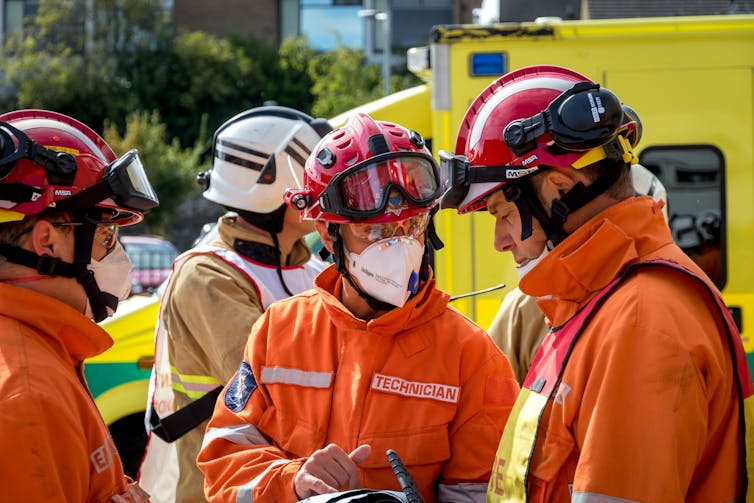The UK’s record-breaking heatwave made it clear how unprepared much of the country is for extreme weather caused by climate change. There were hundreds of fires reported around the country, making it UK firefighters’ busiest day since the second world war – and just a glimpse of what’s to come.
Climate change models don’t always predict the complex, cascading nature of extreme weather until just days in advance, and fire and rescue services need to be prepared. Understanding the detailed nature of future risks and how they overlap with human behaviour is vital to plan effectively.
The UK fire and rescue service responds to incidents spanning the full range of environmental risks. The extreme weather we currently view as extraordinary will soon become more commonplace. Predictions suggest the UK will see a higher frequency of different combinations of wildfires, floods, high winds, storms and rising sea levels. Other related changes – increased incidents of water rescues due to people cooling off in rivers and lakes – will also require the fire service. Overall, the future of the fire and rescue service looks much busier.
The service is currently highly trained and well equipped to deal with a range of rescues and emergencies. But it receives the smallest amount of money across emergency services and little attention from politicians and the public. Most services have had to reduce the number of stations, operational firefighters and professional support staff in line with austerity measures over the last 20 years. Without more funding or a way to increase sharing of resources between services, their ability to respond to increasing extreme events will be inhibited.
Currently, the fire sector operates on a model called “community risk planning” – services identify risks in their local area and respond to them. The challenge here is that climate change is mostly understood on a national or global level. With the exception of some information on sea level increases or rainfall, there is little understanding of how climate risks will affect local areas, especially as they happen simultaneously.
Local services often depend on aid from neighbouring areas – a fire service in one county sending surplus equipment or people to help fight a fire in a county down the road. Extreme weather events are likely to cross geographical borders as weather is not contained, so the capacity for this kind of mutual aid will be reduced.
The fire service will need to change its approach from one of preparing for a typical day, to preparing for the worst day. We saw a similar shift with healthcare during the pandemic – and the challenges that emerge when all current staff are working flat out and there is no one else trained, organised and ready to step in.
More extreme weather is just one part of how the world will change in the coming years. Future developments in green technology; changes to the design of our homes; and innovation in transport, farming and work may all have unintended risks.
For example, compromised lithium ion batteries – found in electric vehicles, solar panels, scooters and other electrical devices – have been found to be a serious fire risk. In addition to staffing and funding challenges, the fire service will have to work quickly to identify the skills, equipment and training demands needed to address these future risks, many of which are still unknown.
Serving local communities in a global crisis
The fire service doesn’t just respond to incidents, it does extensive prevention work across the UK to identify who is at risk of fire and other emergencies and why. The service then delivers targeted prevention messages, trying to make sure that the most at risk in a community are kept safe.
Research shows disasters and emergencies have the greatest impact on those most disadvantaged. In the UK, people of colour are significantly more likely to live in areas at high risk from heatwaves. The fire and rescue service will need to invest further in understanding how climate change is affecting these communities, to ensure that disadvantaged groups are not placed at higher risk.

Firefighter wellbeing
The Fire Fighters Charity, National Fire Chiefs Council and my team at Nottingham Trent University are running a survey looking at the psychological health and wellbeing of firefighters. Our aim is to understand how climate change and other challenges affect their role.
Research into the physical health of firefighters shows how extreme heat and PPE affect the body. As the planet gets hotter and fires occur more often, firefighters will experience more illness and injury such as heat exhaustion, physical injuries and errors of judgment from reduced cognitive ability due to heat. They will have to cope with seeing more damage in their own communities to their friends and the places they know.
Academic findings suggest that if the nature of events are large scale, complex, or directly affect a firefighter’s own community, they are more likely to cause trauma. Extreme weather events, irreversibly baked into the changing climate, meet those criteria.
Rowena Hill receives funding from the ESRC (Policy Fellowship to the Department of Levelling Up Housing and Communities on Climate Change) and the National Fire Chiefs Council (project on wellbeing and a project on exploring the association between mental health and the incidents of fire.
This article was originally published on The Conversation. Read the original article.







